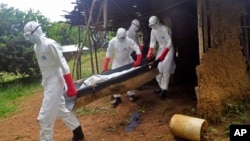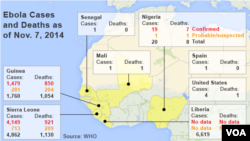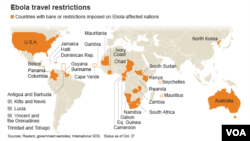South Africa knows all too well how it feels to watch a disease rampage through once-healthy communities, to watch the illness divide society and trigger shame, fear and panic, and to be shunned by the rest of the world.
And so as three West African nations battle with the often-deadly Ebola virus, South African experts say the hard lessons they learned in their nation’s HIV epidemic are as important as ever.
Fighting Ebola, they say, will require many of the same tools needed to fight AIDS, an epidemic that fundamentally transformed the way the world looks at diseases -- not just through the microscope of science, but through the wider lens of society and development.
South African activists like Fatima Shabodien, country director of Action Aid South Africa, have long been on the front lines of the fight.
"It's a profoundly developmental crisis, because it’s not a coincidence that the people most vulnerable to it are poor people, are women, who already have vulnerable livelihoods," Shabodien explained. "So we don’t think people should be more at risk of dying from a virus just because they were born poor. And that’s at the heart of this conversation.”
She is talking about Ebola, but her words also speak to South Africa’s struggle with HIV and AIDS, especially during the early, fear-filled days.
At this stage, the public's understanding about Ebola is "still in the dark ages, and needs the bright light of information" - both for those at risk, and for the rest of the world.
“We know that the stigma has not been limited to these countries. Africans who are in other parts of the world having problems, we know. Football stars. So whether you’re famous, rich or poor, it doesn’t make a difference," she noted.
"People are equating Africanness with an infectious disease. We have to combat that ignorance, to start off with. But there’s a lot of vagueness around the medical conditions for surviving Ebola. So people don’t understand the factors that contribute to survival, and in that vacuum lots of myths have been breeding, with consequences to Ebola survivors struggling to reintegrate into the communities," Shabodien added.
Dr. Fanie Hattingh, founder of the Ebola Project, an initiative that tries to fight Ebola with technology-based tools, says this virus is also, like HIV, an opportunity for innovation.
“I call this emergency business. We have the opportunity to really fast-track technology-driven solutions that work and have been proven in the first world into the most remote parts of West Africa," Hattingh said. "We’ve proven some of them in pilot phases and concepts, we now have to scale them and really show that it can make a difference. It’s also an opportunity for us to build an emergency response and communications platform for the future, because the next Ebola will happen, whether it’s cholera, whether it’s a tsunami or an earthquake."
Bhekinkosi Moyo, executive director of the Southern Africa Trust, a policy group, says Ebola is also a political, financial and human rights issue.
“I think that what we have seen is that the protocol on facilitating free movement of people, goods and services is being affected now. Countries are adopting protectionist policies, they are making movements stricter and that is going to affect the free movement of people," Moyo said. " And without the free movement of people, you’re going to have serious problems in terms of financial capital, in terms of the movement of capital investment. What we are seeing in the countries affected is that the super-rich are actually taking their money out of those countries. … Added to that are questions of human rights, violations that the outbreak is actually bringing, questions of dignity that we need to worry about.”
Doctors continue to battle this disease on the gruesome front lines, where thousands have fallen victim. But the epidemic is having an impact outside West Africa's hospitals and clinics, and the effects may be felt long after the epidemic fades away.
Watch video report from VOA's Zlatica Hoke:
















